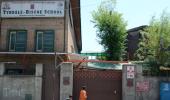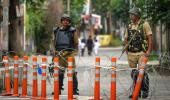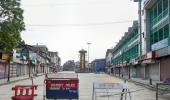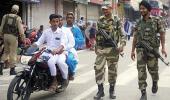'Why should I as a common man not know where my parents are in Kashmir, how they are doing. It is my right,' student Mohammed Aleem Syed, who moved the Supreme Court to be allowed to visit Kashmir, tells Syed Firdaus Ashraf.

The Supreme Court on Wednesday allowed a law student, Mohammed Aleem Syed, from Jamia Millia Islamia University, New Delhi, to visit his parents in Anantnag district of Jammu and Kashmir, and asked the police to provide security for him.
A bench of Chief Justice of India Ranjan Gogoi and Justices S A Bobde and S Abdul Nazeer heard Aleem's plea filed through his advocate Mrigank Prabhakar stating that he has not been able to speak to his parents since August 5.
Aleem spoke to Rediff.com's Syed Firdaus Ashraf about why he went to court.
From August 5, 2019, the day Article 370 was diluted, I have not spoken to my family back home in Anantnag, South Kashmir.
There is news about curfew being imposed all over Kashmir and people being detained across the state, which has made me apprehensive and I have no idea how my family is back home since August 5.
I went to court because I wanted to know the wellbeing of my family and I am happy that the Supreme Court gave the judgment in my favour and paved the way for my visit to Kashmir under security.
I am leaving for Kashmir tomorrow morning.
Contradictory news is coming out of Kashmir right now. On one hand you get the news stating Kashmir is normal, and on the other hand you hear news that the situation is bad in Kashmir.
This is causing more frustration to me because there are diverse views. I don’t know the situation on the ground and I have no first-hand information as landline telephones as well as mobile phones are not working since August 5.
I want to be certain of the wellbeing of my parents because Anantnag in South Kashmir, the place where my parents live, is a very volatile place.
A few friends of mine left New Delhi for Kashmir after August 5 and till date I don’t know where they are and what they are doing because they have not come back to Delhi and I have not been able to get in touch with them. I don’t even know whether they reached their home in Kashmir.
Another thing that is worrying me is, I want to know whether my parents have been detained in Kashmir or not as I am reading news of detention of hundreds of people in Kashmir.
My parents are retired government employees and they have no connection with politics so why should I as a common man not know where my parents are in Kashmir, how they are doing. It is my right.
Flights are going to Kashmir, agreed, but how do I reach South Kashmir? It is a volatile place. I have to travel from Srinagar airport to South Kashmir and I don’t know whether I will get a taxi also at Srinagar airport. Sitting in Delhi, I have no idea what the ground situation in Kashmir is.
If I was able to talk to my brother over the phone he would have come to pick me up at Srinagar airport by taxi. It is more than 20 days since I have spoken to them.
The government said the last time that they will lift the ban on landline telephones but they have not done it yet.
'You don't make the entire state into a prison'
'We don’t know what is happening to Aleem's family,' says Aleem's advocate Mirgank Prabhakar.
Aleem filed a habeas corpus petition because there is a lockdown and he has not been able to speak to his parents.
There is zero connectivity and absolutely no way to know about the wellbeing of his parents so the only manner in which he could have gone was to approach the Supreme Court.
The court has said it will serve his purpose if he goes to J&K under police protection to see his parents.
If the government is saying everything is okay in Kashmir, then who is going into Kashmir? Who is travelling out of Kashmir? We don’t know the answer. The government can say whatever.
If people were travelling to Kashmir the Supreme Court would have dismissed our case but the fact of the matter is that it is not happening. There are restrictions and people are unable to go. We don’t know what is happening to Aleem's family.
Political leaders were sent back and people who were identified as trouble-makers were parcelled out of Kashmir in military aircraft. That does not happen to normal citizens. How do I know what is happening to Aleem’s parents? They are not political activists or connected with politics.
There is no way he can contact them. And how does one enforce their rights? And when the government is saying all Kashmiris are citizens, you don’t make the entire state into a prison.
I agree things will time to settle down but is this best possible manner to act?












 © 2025
© 2025